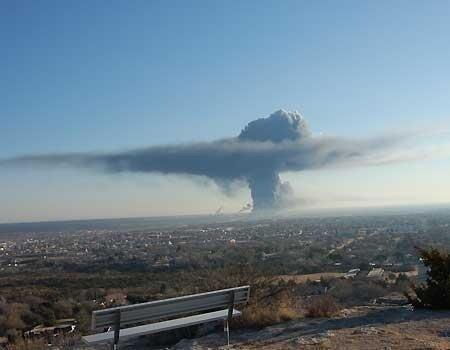Investigators blame lax oversight for recent Texas fertilizer explosion
By ALISON SIDER
The US Chemical Safety Board said Thursday a West, Texas, fertilizer facility that exploded earlier this year fell between the cracks of the US safety regulation network that needs to be updated.
"The CSB has determined that ammonium nitrate fertilizer storage falls under a patchwork of U.S. safety standards and guidance--a patchwork that has many large holes," chairman Rafael Moure-Eraso told the US Senate Committee on Environment and Public Works.
 The committee's meeting Thursday was prompted by a string of industrial accidents in recent months -- the fertilizer facility explosion in West, which killed at least 14 people in April; an explosion at a petrochemical plant in Geismar, La. that killed two workers, and a fire at Chevron's Richmond, Calif. refinery last year.
The committee's meeting Thursday was prompted by a string of industrial accidents in recent months -- the fertilizer facility explosion in West, which killed at least 14 people in April; an explosion at a petrochemical plant in Geismar, La. that killed two workers, and a fire at Chevron's Richmond, Calif. refinery last year.
In a report of preliminary findings released Thursday, the CSB said the West explosion was caused by an intense fire in a wooden warehouse building that led to the detonation of about 30 tons of ammonium nitrate stored in wooden bins.
The building had no sprinklers or fire detection systems, so the fire was "intense and out of control" by the time firefighters were able to reach the site, the CSB said in its preliminary findings report.
And volunteer firefighters were not made aware of the risk that ammonium nitrate at the facility could explode --12 firefighters and emergency responders were killed when the ammonium nitrate suddenly detonated while they were trying to fight the initial blaze.
The storage conditions at the West facility did nothing to mitigate the risk of a fire, but did not run afoul of existing regulations, Mr. Moure-Eraso said. Other countries, like the UK, recommend that buildings and bins where ammonium nitrate is stored be noncombustible, he said.
"The fertilizer industry tells us that US sites commonly store ammonium nitrate in wooden buildings and bins -- even near homes, schools, or other vulnerable facilities. This situation must be addressed," Mr. Moure-Eraso said.
A spokesman for West Fertilizer Co. declined to comment.
Facilities like the one in West fall outside of existing federal process safety standards developed in the 1990s. Texas and most counties have no mandatory fire code, and the West facility did not have to comply with voluntary standards for ammonium nitrate storage. Even those are out of date, the CSB said in its report.
While the Occupational Safety and Health Administration does regulate how ammonium nitrate fertilizer is handled, the agency's regulations don't go far enough -- allowing wooden bins and buildings to be used for storage and only requiring sprinklers to be installed where high volumes of ammonium nitrate are stored, the CSB said.
Mr. Moure-Eraso said that in 2002, the CSB recommended to the Environmental Protection Agency that it include reactive chemicals, like ammonium nitrate, in its Risk Management Plan, designed to prevent catastrophic environmental damage from hazardous chemicals.
US Sen. Barbara Boxer (D., Calif.) criticized the EPA for not adopting that recommendation or taking steps to reduce the risks posed by chemical facilities.
"I'm unsympathetic to the attitude I hear, which is a lack of urgency. Lives are being lost, and recommendations were made a long time ago, and nothing's happening," she said.
Sen. Boxer said the EPA can strengthen safety systems under existing laws without new legislation.
Mr. Moure-Eraso also said federal agencies charged with regulating and inspecting facilities for safety were "under duress," without enough resources to devote to checking up on the facilities they oversee. The CSB's investigations into the West and Geismar incidents have depleted the agency's resources, he said, and it cannot take on any new investigative work.






Comments